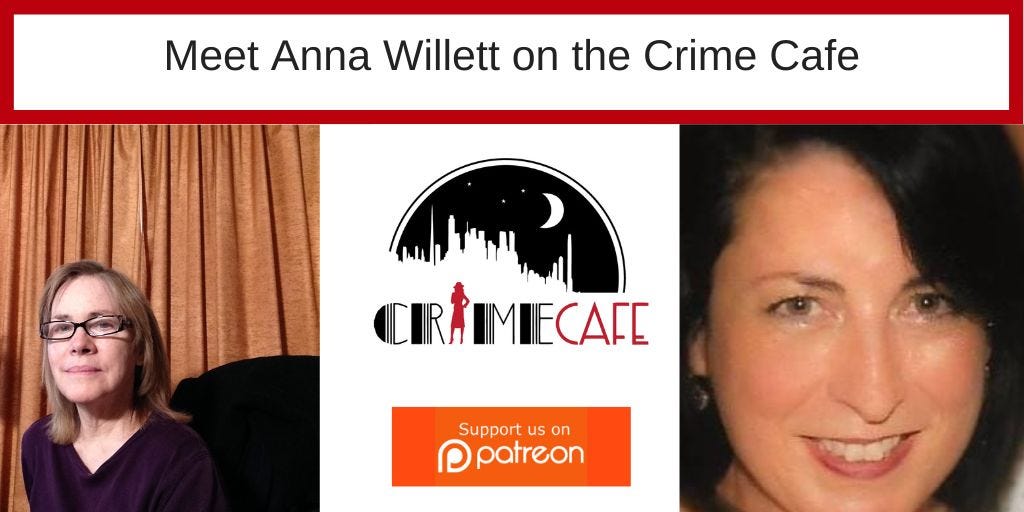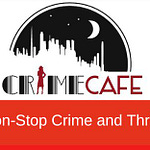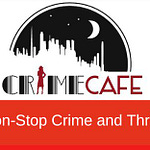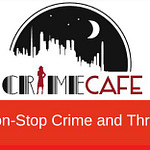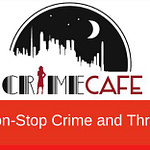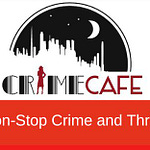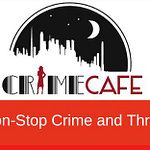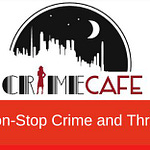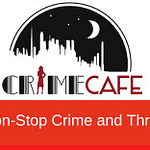This week’s episode of the Crime Cafe podcast features my interview with crime writer Anna Willett.
Check out our discussion about thriller writing and her Cold Case Mystery series.
You can download a PDF of the transcript here.
Debbi: Hi everyone. My guest today is the author of several thriller novels, including five books in The Cold Case Mystery series. Her latest book is called Needles and Pins, and it's this week's giveaway, so make sure to check out the giveaway on my blog or on her Instagram. You can find it there on Instagram for sure. So it is my pleasure to introduce as my guest the author, Anna Willett. Hi Anna. How are you doing today?
Anna: Hi, I'm well. How are you?
Debbi: Good, thank you, although right now at the moment, I'm in Maryland where tornadoes are threatening somewhere on the horizon.
Anna: Oh really?
Debbi: Yes. Apparently we've been getting tornado warnings in different parts, not too far from where I live, but it's all very sketchy right now. Hopefully I won't be interrupting this podcast to dive under a desk or into a bathroom or something. I don't know where I'd go.
Anna: Oh, that's scary.
Debbi: It is. They are scary. In any case, let's talk about your thrilling novels rather than my thrilling tornadoes. At what point did you decide to write a series?
Anna: Well, as I said in the post, I wrote a book called The Woman Behind Her, and the main character finds herself as the suspect in a murder. The lead detective on that case was Veronica Pope, who I became very interested in and wanted to write more of, and I thought, I think that I can do a lot more with this character, and so I'm going to write another book. So after really what was the second book in the series, I thought, there's so much more I could do. There's so many more places I could take her. I had so many more ideas for the sort of situation she could be in and her team, and it went from there.
Debbi: It's fascinating. How many books had you written before you made that decision to go after that series?
Anna: I think it would've been 13, maybe 12 or 13 books.
Debbi: That's very interesting how a character gripped you to the point where you decided to create a series for the first time.
Anna: Yes. Well, I'd had another series. It was just three books, and it was about a journalist, but all the others are standalones. And the woman behind her was, I thought, going to be a standalone, but it turned into this ongoing series.
Debbi: Yes, it's fascinating. What inspired you to create Veronica Pope? What kind of inspiration went into creating the character itself?
Anna: Well, I wanted a female leader. I like to write about strong female lead characters, and so I wanted a female detective, and I wanted her to be - I'm going to say normal - so that she's just an average woman who's very good at her job, and she's not a super cop. She's not invulnerable to being hurt. She cares; she worries about things. She has her insecurities, she has her family life. She's a single mother. She has ambitions for her job, but she's also a little bit funny and down to earth, and that's the sort of character I would like to read.
I like to write about strong female lead characters, and so I wanted a female detective, and I wanted her to be - I'm going to say normal - so that she's just an average woman who's very good at her job, and she's not a super cop.
Debbi: Yeah, a very relatable sort of character.
Anna: Yeah, yeah.
Debbi: And skilled.
Anna: Yes. So I wanted her to be really good at her job and very insightful and very observant, but at the same time, I wanted her to have the same worries that most people would.
Debbi: Yes, exactly. Do you plan to write more books in the series?
Anna: I haven't decided. I'm not sure. I might. If something comes to me, if an idea comes to me that I think would be perfect for Veronica. Not all, but quite a few of the books I drew from real unsolved cases in Western Australia. This last one was not one of those, but most of them I've drawn on those cases. Some were unsolved when I wrote them. Some were solved, but not really to the satisfaction of knowing everything about them. So I sort of drew on those cases and took them in another direction and put Veronica in them. So if something comes up that fascinates me, a crime or an unsolved cold case, then I might take that and write about that with Veronica.
Not all, but quite a few of the books I drew from real unsolved cases in Western Australia. This last one was not one of those, but most of them I've drawn on those cases.
Debbi: So it sounds like you take a lot of inspiration from true crime.
Anna: In Western Australia, yes. The previous one, The Ideal Couple, which is set in a small mining town way outside of Perth, I took the inspiration from a real life case where a husband and wife went out into the Outback and were prospecting and went missing, and it's never been solved. And so I took that and changed it and put Veronica into it, and she comes in when it's a cold case and she manages to solve it. So those sort of things, I think, oh, we don't really know anything about what happened and what if it was this and this and this, and then I could put Veronica in there. If something grabs me like that, I'd definitely write another one.
Debbi: Cool. It sounds like each of these books are not necessarily part of a planned arc for the series, more like things come to you and they're more spontaneous, like, what would she do in this situation?
Anna: Yes, yes, that's exactly right. So there's no real arc to it. I sort of know where she's going on her journey, but the cases that will come across her desk and the ones that she'll want to investigate, I'll wait for the inspiration for those.
Debbi: That's really cool. That's great. How would you describe your writing to someone who's never read your work?
I sort of know where she's going on her journey, but the cases that will come across her desk and the ones that she'll want to investigate, I'll wait for the inspiration for those.
Anna: I would say that most of my books are thrillers, even the crime, the Cold Case series, they are thrillers, mystery/suspense thrillers. Most of my books are thrillers. A few are horror. I have a few horror as well as straight thrillers. A couple of them are supernatural horror. Quite a lot of them are domestic thrillers. So it just depends on the inspiration and the story ideas. I usually have a few ideas in a queue in my brain when I'm deciding which one to work on next. But, if you like thrillers, if you like mystery, if you like suspense, tension, and they're probably a little bit grittier than a cozy mystery, for example.
Debbi: Right, right. They sound like fun.
Anna: They are fun to write.
Debbi: What kind of readers do you generally attract? Do you have a sense of who you appeal to?
Anna: I think I appeal to a lot of overseas readers who are interested in thrillers and crime and suspense, but also enjoy the location as it's something new for many of them. Most people don't know very much about Western Australia. Most people know more about the Eastern states, and because Perth is the most isolated city in the world, you sort of have a feeling it's a place where anything could happen, and I think that appeals to a lot of overseas readers.
Most people don't know very much about Western Australia. Most people know more about the Eastern states, and because Perth is the most isolated city in the world, you sort of have a feeling it's a place where anything could happen, and I think that appeals to a lot of overseas readers.
Debbi: Well, I'm intrigued. Sounds fascinating. How much research do you do when you prepare to write?
Anna: I do quite a lot of research, particularly for the series because it's a police procedural, so I try to be as accurate as I possibly can be. I have a friend who is a former Western Australian police detective, and I talk to him a lot about how do you think they would react in this situation? What do you think would be the next step when they're doing this? Is it feasible that they would do this? How would they access this information? What exactly do you think they would say when serving a search warrant in this situation? Where would that allow them to search? Would I have to have a separate warrant for that? I try to get all the details as correct as I can possibly get them so there's that authenticity.
Debbi: Yes, yes. If you're going to do police procedural type stuff, you definitely need that.
Anna: And unlike a lot of other places in the world, there's not a lot of information on any procedural elements in Western Australia. You can buy books on police procedures in the UK and in some parts of America, but you can't really find anything on Western Australia in that way.
Debbi: How interesting.
Anna: So you really need someone you can ask.
Debbi: Yes, because things do have a tendency to change from region to region.
Anna: Yes. In Australia it's a little bit more like the UK. Generally it’s the same, but in each state there's a different police force. Most things are very similar in the way that they would operate, but I want it to be as authentic as I can make it.
Debbi: Sometimes I've noticed in the United States anyway, from county to county, some things can change about the way business is done, so I was wondering if the same thing was true of Eastern and Western Australia?
Anna: Not to the same extent as probably in America. We sort of mirror the British system here in Australia for the most part, and although there are different police forces, most procedural things would be very similar. There might be slight changes, differences in the law in different states, but it's a very similar sort of approach in every state.
Debbi: Right, right. What authors do you find most inspiring to read?
Anna: I really enjoy Karin Slaughter, and I like Michael Connelly, Paula Hawkins, Clare Mackintosh. I have been reading a bit of Colleen Hoover, which is not crime, which is unusual for me to not be reading crime, but I do enjoy her writing as well. I like Stephen King. I'll read anything. If it's a good story, I'll read anything, but my fallback is usually thrillers and crime.
Debbi: Yes. Are you more of a plotter or a pantser?
Anna: I'm a pantser
Debbi: People know. Nobody has to think twice about that one.
Anna: Yes.
Debbi: Interesting.
Anna: I try. Sometimes I think, yes, I'm going to plot a little bit more this time and I'll write it all out. And then next thing I know, everything has taken me somewhere completely that I didn't expect to go.
Debbi: That's interesting. I find that I can plan things, but I don't necessarily stick to plan, let's put it that way.
Anna: Sticking to the plan, it's hard to stick to the plan when the characters and the situation are telling you something else.
Debbi: Exactly. Precisely. What are you working on now?
Anna: I'm working on a standalone thriller at the moment, a domestic thriller. I'm also working on a horror novel when I have time as well. So I'm sort of writing one and writing a little bit of the other one at the same time. I'm taking my time on this standalone novel. I'm not rushing it or anything like that, so I don't know when it will be finished, but it's more of a domestic thriller.
Debbi: I think it's good to take one's time on things.
Anna: Yes. I'm enjoying taking my time. I guess the central theme of it in some ways is elder abuse.
Debbi: Ah, I've seen that come up a lot in books lately.
Anna: Well, it's something that's very real and it's more common than I think most people realize. I've spoken to a lot of people about it, family and nurses from nursing homes and yes, it's something that's very real and I think often not really explored.
Debbi: What sort of writing schedule do you keep?
Anna: I usually write at night. I'm more of an evening writer. I don't write in the morning or anything like that. I like to write later in the night, and I like to write longhand in a notebook and then I transcribe in the day.
I don't write in the morning or anything like that. I like to write later in the night, and I like to write longhand in a notebook and then I transcribe in the day.
Debbi: Interesting that you write out by longhand first. I haven't done that in ages.
Anna: I didn't used to. I started just typing and that's how I did the first few books. But then when I started writing notes and then more notes, I just found the ideas came a little bit easier when I'm using the pen than when I'm typing. And for some reason it just seems to come easier to me and flow more. I get a sore hand, but it comes easier, the ideas and the words.
Debbi: I can understand that actually, because I have a tendency to write movie reviews and book reviews out at night
Anna: I love it.
Debbi: But especially movie reviews, I find out I will just sit down and just start writing them out, and they just kind of read okay. It's like, I could put this up on a blog, which I do.
Anna: It flows. It flows really well when you're writing by hand, I think.
Debbi: It's interesting. I never thought about doing novels that way or anything like that.
Anna: I fill a lot of notebooks.
Debbi: I fill up a lot of notebooks as well. Oh God. I journal. I spent years journaling. It seems like decades even. What advice would you give to anyone who's interested in writing for a living?
Anna: It wouldn't be an easy road if it's for a living. Don't expect that to happen really quickly, or with one book. It takes a lot of time, a lot of work, a lot of books, a lot of hours spent writing. Just keep persevering and write another one and another one. And if the one you write does okay, but it's not great, you just have to write another one. You just have to keep going.
It takes a lot of time, a lot of work, a lot of books, a lot of hours spent writing. Just keep persevering and write another one and another one.
Debbi: That's it. Absolutely. Never give up.
Anna: And don't expect it to make you a fortune when you write one and publish them. Having modest expectations, I think would be the best thing. And don't give up your day job.
Debbi: Exactly. Totally right. Total words of wisdom there, folks. Really! Is there anything else you'd like to add before we finish up?
Anna: No, just that I really enjoyed this. I was really looking forward to talking to you.
Debbi: Same here. Well, I really appreciate your being here, and thank you so much.
Anna: Well, you're welcome. It was fun.
Debbi: It was fun for me too. Someday I hope to visit Australia.
Anna: I think you would love it like most people. Yes, you should definitely come to Perth. It's a wonderful place to visit.
Debbi: Oh, cool. I will definitely keep that in mind. Have to go, have to go places. In any case, I just want to thank you again for spending time with us, Anna, and my thanks to everyone listening. If you enjoyed the show, please leave a review if you would. It helps. We are also Patreon supported with bonus episodes and other perks for supporters, so check that out if you would - patreon.com/crimecafe. So until next time, when our guest will be Catherine Rymsha, take care and happy reading.




